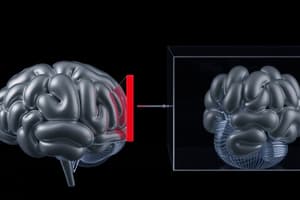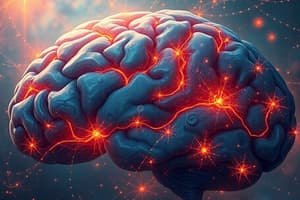Podcast
Questions and Answers
Why might research into the Multi-Store Model (MSM) of memory, which utilizes artificial tasks, be criticized?
Why might research into the Multi-Store Model (MSM) of memory, which utilizes artificial tasks, be criticized?
- Because the results may lack ecological validity due to the artificial nature of the tasks. (correct)
- Because the encoding methods used are too complex to generalize.
- Because participants find the tasks too easy, leading to inaccurate results.
- Because the study lacks inter-rater reliability.
Which of the following criticisms accurately reflects a limitation of the Multi-Store Model (MSM) of memory?
Which of the following criticisms accurately reflects a limitation of the Multi-Store Model (MSM) of memory?
- It fails to explain how individuals can remember information without rehearsal or why rehearsed information is sometimes forgotten. (correct)
- It overemphasizes the role of sensory memory in filtering information.
- It suggests that short-term memory has a larger capacity than sensory memory.
- It inaccurately describes the capacity of long-term memory as limited.
According to the content, what does the working memory model suggest about Short-Term Memory (STM)?
According to the content, what does the working memory model suggest about Short-Term Memory (STM)?
- STM consists of five components. (correct)
- STM primarily relies on acoustic encoding.
- STM is unlimited in capacity.
- STM is a single, undifferentiated storage system.
Which of the following best describes an episodic memory?
Which of the following best describes an episodic memory?
What is a key characteristic that distinguishes episodic memory from other types of long-term memory?
What is a key characteristic that distinguishes episodic memory from other types of long-term memory?
If someone recalls how to play a musical instrument, which type of long-term memory are they primarily using?
If someone recalls how to play a musical instrument, which type of long-term memory are they primarily using?
Which scenario best exemplifies the use of episodic memory?
Which scenario best exemplifies the use of episodic memory?
A person has difficulty recalling the specific details of a car accident they witnessed last year, but they can still describe generic information such as what cars are and how accidents generally occur. What does this suggest about their memory?
A person has difficulty recalling the specific details of a car accident they witnessed last year, but they can still describe generic information such as what cars are and how accidents generally occur. What does this suggest about their memory?
Why is the duration of sensory information held in the sensory register (SR) only milliseconds?
Why is the duration of sensory information held in the sensory register (SR) only milliseconds?
What role does attention play in the flow of information between memory stores?
What role does attention play in the flow of information between memory stores?
Which type of coding is typically used when information enters the short-term memory (STM)?
Which type of coding is typically used when information enters the short-term memory (STM)?
According to Miller's research, what is the approximate capacity of short-term memory?
According to Miller's research, what is the approximate capacity of short-term memory?
What is the estimated duration of short-term memory (STM) if the information is not rehearsed?
What is the estimated duration of short-term memory (STM) if the information is not rehearsed?
Why is rehearsal necessary for information to transfer from STM to LTM?
Why is rehearsal necessary for information to transfer from STM to LTM?
According to the multi-store model of memory, what is the correct sequence of memory stores through which information flows?
According to the multi-store model of memory, what is the correct sequence of memory stores through which information flows?
What is the key difference between maintenance rehearsal and elaborative rehearsal?
What is the key difference between maintenance rehearsal and elaborative rehearsal?
Which statement best characterizes the coding process in the sensory register?
Which statement best characterizes the coding process in the sensory register?
Which of the following best describes the capacity and duration of long-term memory (LTM)?
Which of the following best describes the capacity and duration of long-term memory (LTM)?
What is the main difference between iconic and echoic memory within the sensory register?
What is the main difference between iconic and echoic memory within the sensory register?
What process is necessary to access information stored in long-term memory (LTM)?
What process is necessary to access information stored in long-term memory (LTM)?
If someone briefly sees a picture and then tries to recall it, which memory store is initially involved in holding this visual information?
If someone briefly sees a picture and then tries to recall it, which memory store is initially involved in holding this visual information?
A person is exposed to a multitude of sensory stimuli at a party. According to the MSM, which component of memory is primarily responsible for initially processing this large volume of sensory information?
A person is exposed to a multitude of sensory stimuli at a party. According to the MSM, which component of memory is primarily responsible for initially processing this large volume of sensory information?
How is information primarily coded in long-term memory (LTM)?
How is information primarily coded in long-term memory (LTM)?
Which statement best describes the capacity of long-term memory (LTM)?
Which statement best describes the capacity of long-term memory (LTM)?
What is the capacity of the sensory register according to the multi-store model of memory?
What is the capacity of the sensory register according to the multi-store model of memory?
Which of the following scenarios best illustrates the function of the echoic memory store?
Which of the following scenarios best illustrates the function of the echoic memory store?
Which of the following is the most accurate description of the duration of long-term memory (LTM)?
Which of the following is the most accurate description of the duration of long-term memory (LTM)?
What would be an everyday example of iconic memory in action?
What would be an everyday example of iconic memory in action?
Why might some information appear to be 'forgotten' from long-term memory (LTM)?
Why might some information appear to be 'forgotten' from long-term memory (LTM)?
What did Baddeley's (1966) study on word recall suggest about the differences between short-term memory (STM) and long-term memory (LTM)?
What did Baddeley's (1966) study on word recall suggest about the differences between short-term memory (STM) and long-term memory (LTM)?
How did the case study of HM, who had his hippocampus removed, contribute to the understanding of memory?
How did the case study of HM, who had his hippocampus removed, contribute to the understanding of memory?
Which of the following is a limitation of the multi-store model (MSM) of memory?
Which of the following is a limitation of the multi-store model (MSM) of memory?
A patient demonstrates the ability to recall factual information but cannot remember personal life events. Which area of the brain is MOST likely to be affected, based on the information about long-term memory (LTM) storage?
A patient demonstrates the ability to recall factual information but cannot remember personal life events. Which area of the brain is MOST likely to be affected, based on the information about long-term memory (LTM) storage?
A person can tie their shoelaces without consciously remembering the steps involved, but struggles to recall specific details about when and where they first learned. This scenario illustrates a difference between which two types of long-term memory (LTM)?
A person can tie their shoelaces without consciously remembering the steps involved, but struggles to recall specific details about when and where they first learned. This scenario illustrates a difference between which two types of long-term memory (LTM)?
While brain scans offer objective evidence for distinct long-term memory (LTM) stores, what is a significant limitation of using case studies to support this theory?
While brain scans offer objective evidence for distinct long-term memory (LTM) stores, what is a significant limitation of using case studies to support this theory?
Learning a new language involves grasping vocabulary and grammar rules and recalling specific classroom experiences. This overlap primarily challenges which aspect of the traditional long-term memory (LTM) model?
Learning a new language involves grasping vocabulary and grammar rules and recalling specific classroom experiences. This overlap primarily challenges which aspect of the traditional long-term memory (LTM) model?
If damage to the temporal lobe impairs semantic memory, what specific deficit would MOST likely be observed in a patient?
If damage to the temporal lobe impairs semantic memory, what specific deficit would MOST likely be observed in a patient?
Which scenario best exemplifies episodic memory?
Which scenario best exemplifies episodic memory?
What distinguishes semantic memory from episodic memory?
What distinguishes semantic memory from episodic memory?
Which activity relies most heavily on procedural memory?
Which activity relies most heavily on procedural memory?
Which statement accurately describes the nature of procedural memories?
Which statement accurately describes the nature of procedural memories?
If someone can remember how to play a musical instrument but struggles to recall what they ate for dinner last night, which type of long-term memory is likely intact?
If someone can remember how to play a musical instrument but struggles to recall what they ate for dinner last night, which type of long-term memory is likely intact?
A patient with damage to their hippocampus can still recall general facts but cannot form new memories of daily events. This suggests impairment to which type of memory?
A patient with damage to their hippocampus can still recall general facts but cannot form new memories of daily events. This suggests impairment to which type of memory?
A person who knows that 'water boils at 100 degrees Celsius' is demonstrating:
A person who knows that 'water boils at 100 degrees Celsius' is demonstrating:
Which of the following scenarios primarily involves recalling an episodic memory?
Which of the following scenarios primarily involves recalling an episodic memory?
Flashcards
Multi-store Model of Memory (MSM)
Multi-store Model of Memory (MSM)
A framework proposed by Atkinson & Shiffrin explaining how memories are created and stored in three stores.
Sensory Register
Sensory Register
The initial stage in memory where sensory information is briefly held before processing.
Short-term Memory
Short-term Memory
The second store in MSM, where information is temporarily held for a short duration.
Long-term Memory
Long-term Memory
Signup and view all the flashcards
Coding
Coding
Signup and view all the flashcards
Modality-specific Coding
Modality-specific Coding
Signup and view all the flashcards
Iconic Memory
Iconic Memory
Signup and view all the flashcards
Echoic Memory
Echoic Memory
Signup and view all the flashcards
Sensory Registration
Sensory Registration
Signup and view all the flashcards
Attention
Attention
Signup and view all the flashcards
Short-term Memory (STM)
Short-term Memory (STM)
Signup and view all the flashcards
Capacity of STM
Capacity of STM
Signup and view all the flashcards
Duration of STM
Duration of STM
Signup and view all the flashcards
Rehearsal
Rehearsal
Signup and view all the flashcards
Maintenance Rehearsal
Maintenance Rehearsal
Signup and view all the flashcards
Elaborative Rehearsal
Elaborative Rehearsal
Signup and view all the flashcards
Episodic Memory
Episodic Memory
Signup and view all the flashcards
Semantic Memory
Semantic Memory
Signup and view all the flashcards
Procedural Memory
Procedural Memory
Signup and view all the flashcards
Hippocampus
Hippocampus
Signup and view all the flashcards
Clive Wearing Case Study
Clive Wearing Case Study
Signup and view all the flashcards
HM Case Study
HM Case Study
Signup and view all the flashcards
Examples of Semantic Memory
Examples of Semantic Memory
Signup and view all the flashcards
Examples of Procedural Memory
Examples of Procedural Memory
Signup and view all the flashcards
Working Memory Model
Working Memory Model
Signup and view all the flashcards
Ecological Validity
Ecological Validity
Signup and view all the flashcards
Types of Long-Term Memory
Types of Long-Term Memory
Signup and view all the flashcards
Limitations of MSM
Limitations of MSM
Signup and view all the flashcards
Retrieval
Retrieval
Signup and view all the flashcards
Coding in LTM
Coding in LTM
Signup and view all the flashcards
Displacement in STM
Displacement in STM
Signup and view all the flashcards
Distinct storage for STM and LTM
Distinct storage for STM and LTM
Signup and view all the flashcards
Baddeley's study
Baddeley's study
Signup and view all the flashcards
Case study of HM
Case study of HM
Signup and view all the flashcards
Brain Area Associations
Brain Area Associations
Signup and view all the flashcards
Study Notes
Multi-store Model of Memory (MSM)
- MSM proposes a system for how memories are created and stored.
- Three memory stores: sensory register, short-term memory (STM), and long-term memory (LTM).
- Information flows between these stores.
Sensory Register
- Sensory register (SR) is the entry point for all sensory information.
- Five senses: sight, sound, smell, touch, taste.
- Coding is modality-specific (e.g., iconic memory for visual information, echoic memory for auditory information).
- High capacity.
- Very short duration (milliseconds).
- Attention is required for information to move to STM.
Short-Term Memory (STM)
- Coding is mainly acoustic (sounds).
- Limited capacity (approximately 7 +/- 2 items).
- Limited duration (approximately 18 seconds).
- Rehearsal is needed to maintain information in STM and transfer it to LTM.
- Maintenance rehearsal: simple repetition.
- Elaborative rehearsal: deeper processing and linking information.
Long-Term Memory (LTM)
- Coding is mainly semantic (meaning-based).
- Potentially unlimited capacity.
- Potentially unlimited duration.
- Information is retrieved from LTM by accessing and transferring it to STM.
Evaluation of MSM
- Strengths:
- Supported by controlled laboratory studies (coding, capacity, duration).
- Supported by case studies of brain-damaged patients (e.g., HM).
- Suggests separate memory stores.
- Limitations:
- Too simple – STM and LTM are more complex than the MSM suggests, with multiple components in each.
- Limited application – uses artificial tasks, not real-world tasks.
- Lacks ecological validity.
- Oversimplification – does not account for the nature of each memory type.
Types of Long-Term Memory
- Three types of LTM: episodic, semantic, and procedural.
Episodic Memory
- Memories of personal events and experiences.
- Time-stamped and linked to a specific location and context.
- Includes emotions, sensations, and associated details from that specific event.
Semantic Memory
- General knowledge about the world.
- Not time-stamped or linked to personal experience.
- Often factual and not personal.
Procedural Memory
- Memories of skills and actions.
- Usually automatic and unconscious.
- Acquired through practice and repetition.
Studying That Suits You
Use AI to generate personalized quizzes and flashcards to suit your learning preferences.




